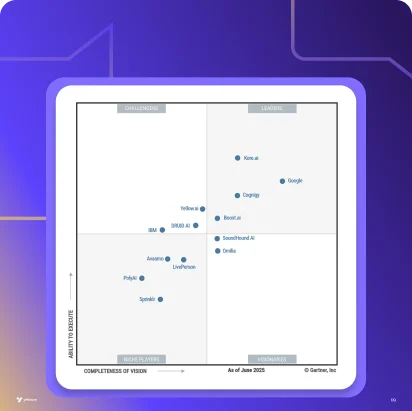Executive summary:
With their limitless capacity to create, generative AI tools are reshaping how we think about creativity and efficiency. An obvious case in point is ChatGPT. What are generative AI tools, and how are they changing certain industries? All of its subtleties will be explained in this detailed blog. Explore their various uses, from writing and content generating, image creation, and video production to complicated problem-solving. With the knowledge you gain, you may choose wisely which one works perfectly for your company’s future success. Learn about the list of best generative AI tools to improve your creativity, productivity, business, and problem-solving skills.
What is Generative AI?
A subcategory of artificial intelligence, Generative AI aims to mimic human creativity by creating models that can independently produce original, high-quality material. It analyzes and learns from data using NLP, deep learning, and neural networks. This contemporary technology doesn’t only follow set protocols. On the contrary, it recognizes patterns, deduces insights, and generates material independently that mimics its training data’s style, content, or other traits.
The power of generative AI lies in its transformative prowess across various industries. By applying probabilistic methods, these models can generate fresh instances reflecting original data, demonstrating creativity beyond their initial programming. As businesses increasingly adopt generative AI tools, they explore new possibilities, streamline processes, and reduce manual efforts. A 2023 study by McKinsey estimated that generative AI capabilities would boost the world economy by as much as $4.4 trillion per year.
Top 10 Generative AI tools
Generative AI tools are emerging as incredible catalysts for innovation and inventiveness. Here, we’ll explore the list of top 10 generative AI tools that redefine the perimeters of possibility, equipping businesses and individuals with the means to convert ideas into reality. Their applications range from text generation, image and video productions to several other tasks.
Text generation
For text generation, several of these tools are creating ripples in the written content industry. Here are a few notable ones with their pros and cons.
Jasper
Jasper is a generative AI tool meant to revolutionize content creation. It harnesses advanced language models to produce high-quality, engaging text for various applications, from blog posts and copywriting to creative stories and product descriptions. Writers, copywriters, marketers and entrepreneurs prefer Jasper for its user-friendly interface and powerful capabilities.
Pros:
- Saves time significantly by drafting the text and editing content rapidly.
- Scores high on versatility as it can generate a plethora of content types.
- Gives an intuitive editing environment with smart suggestions and improvements.
- Understands the context and generates relevant content.
- Anyone without a technical background can use it effortlessly.
Cons:
- It might be advanced but may fail to match the high creativity of a seasoned human writer.
- AI output may sometimes be irrelevant or repetitious and need human intervention.
Writesonic
Writesonic is a go-to generative AI tool for writers and marketers wanting to scale up content creation without compromising quality. You can create a plethora of engaging content ranging from ad copies to product descriptions, full-length blog entries, and essays. It lets users choose and maintain a content tone.
Pros:
- Meets digital marketing needs perfectly and can create engaging social media posts and strategic email campaigns.
- Generates the first draft and completes the final articles at a breakneck pace.
- The user-friendly interface needs minimal skills.
- Offers different writing modes and styles suiting various kinds of content.
Cons:
- At times, some outputs may demand thorough editing to meet high standards.
- On complex subjects, it may not match human expertise.
Bard
Google entered the generative AI tool market with Bard. This tool is created to assist with content development and function as an advanced chatbot. Building on the transformer-based concept Language Model for Dialogue Applications or LaMDA, Bard offers a solid challenge for ChatGPT and similar AI tools. It also has features such as code debugging, generation, and explanation, making it valuable for programming tasks.
Pros:
- Benefit from Google’s commitment to ethical and transparent AI development.
- Fine-tuned performance through intensive training using input from thousands of testers.
- Compared to other free versions of Generative AI tools, it gives up-to-date and relevant responses.
- From content production to coding aid, Bard supports a variety of functions outside its chatbot role.
Cons:
- Google Bard debuted in March 2023 and is currently developing. Therefore, it may produce erroneous data.
- Responses may be inaccurate due to training dataset biases.
- May address specialty issues incompletely or generically.
- May respond differently depending on query specificity and complexity.
- Trained with a smaller dataset than mature language models. It may cause user query misinterpretation.
Related read: The ultimate guide for 2024
Cohere Generate
Cohere Generate is a powerful text generator. Companies seeking flexible and efficient AI-powered content solutions are favoring it, which streamlines and improves product management, sales, and digital marketing. You may write adverts, product descriptions, and more. Cohere’s Playground lets people try its features for free. It supports public, private, and hybrid clouds and has a simple API for content creation and integration.
Pros:
- Supports various text generation tasks, including blog posts and personalized emails.
- Reliable and effective, trusted by Spotify and BambooHR.
- Easy-to-use platform simplifies complex content generation.
Cons:
- Despite its versatility, its marketing and sales concentration may not meet all corporate objectives.
- Smaller organizations may find the Generate model more expensive to embed.
- Though improving, it may not approach the precision of GPT-3.5 or GPT-4.
Claude
An advanced artificial intelligence chatbot assistant and content creator, Claude, was created by Anthropic. Its configurable conversational tones and emphasis on safety have garnered praise for its cleverness, responsiveness to user input, and comic timing. It has two variants, Claude Instant and Claude Classic, for different purposes. Developers can integrate and expand its capabilities. For greater accessibility, this Generative AI tool supports many programming and spoken languages.
Pros:
- Improves conversation richness by understanding and retaining more information than other models.
- Prioritizes user safety by including red-team prompts to reduce risky content production.
- Provides elaborate explanations when unable to answer questions.
- Quora, DuckDuckGo, and Notion AI were its early adopters, demonstrating credibility and effectiveness in various contexts.
Cons
- Caution should be exercised when using it since it is still possible for it to react negatively to hypothetical requests.
- Has no free version, which could exclude casual users and small businesses.
- Limited by the inability to retrieve real-time internet data.
Image generation
The Gen-AI market is projected to reach US$207.00bn by 2030, with a compound annual growth rate of 20.80% from 2024 to 2030. There is a foray of an array of Generative AI tools in image generation. It has brought a sea change across the sector.
DALL-E 2
Revolutionizing photorealism and originality in AI-generated graphics, DALL-E 2 is a game-changing generative AI tool for image and art production developed by OpenAI. With its help, users may create brand-new photographs from scratch or make highly precise and versatile edits to existing ones. It produces 4x higher-resolution photos than its predecessor, DALL-E. From a single source image, it generates several variations, and it adds to or changes pre-existing images according to user input.
Pros:
- Generates more realistic graphics that closely reflect user requirements.
- Enhanced ability to reject unsuitable inputs and prevent explicit material.
- Developers may integrate DALL-E into apps, broadening its use across sectors.
Cons:
- New content generation now requires a credit purchase mechanism instead of free access.
- Less accurate or undesired visuals may be produced by requests that are complex or abstract.
Midjourney
Midjourney, a cutting-edge generative AI tool, lets artists, designers, and creatives achieve their ideas through AI-driven picture production. From written descriptions, it generates breathtaking images using advanced artificial intelligence. The rapid generation of numerous visual ideas speeds up the creative process. Midjourney creates a community where artists can inspire and collaborate. A better user experience is guaranteed by constant updates to AI and machine learning.
Pros
- Allows users to customize the artistic process to their preferences.
- Makes it easier to transition from idea to visualization, which is excellent for rapid iterations.
- User-friendly for both experienced and beginner digital artists.
Cons:
- To get the most out of all the features, new users may require some time to get a feel for them.
- The user’s ability to communicate their vision through words significantly impacts output quality.
- Image quality may demand powerful computing resources.
Nightcafe creator
The Gen-AI tool NightCafe Creator harnesses advanced neural network technology to democratize art production, allowing anybody to realize their creative ideas. Users can explore diverse artistic expressions using its classical and contemporary styles. Its user-friendly design ensures that both artists and non-artists may enjoy it. Constantly updated with the most recent advancements in artificial intelligence art production, guarantees high-quality and diverse results.
Pros:
- Facilitates simultaneous production of several artworks, ideal for large projects or collections.
- Simplifies art creation without technological expertise.
- The community provides inspiration, suggestions, and collaboration.
- Cost-effective for high-volume art production.
Cons:
- Offers several styles; however, users may need help personalizing their results.
- User hardware and internet connectivity may affect production speed and quality.
- Some users may require extra time to learn how to use the platform for their purposes.
Appy Pie’s AI Image Generator
Appy Pie’s AI Image Generator offers an innovative solution for creating visually appealing
images tailored to your specific needs. With this powerful AI Design tool, you can transform
written prompts into stunning visuals that capture the essence of your message. Whether you’re
looking to enhance your social media presence, design eye-catching website banners, or create
engaging marketing materials, this image generator has you covered.
This platform not only simplifies the image creation process but also provides a vast array of
customization options. You can personalize your images to align with your brand identity by
choosing from a wide selection of fonts, a vibrant palette of colors, and various backgrounds.
These features empower you to maintain consistency across your digital content, ensuring that
every image resonates with your audience.
Pros:
- Access to an extensive library of over 320 million images from Shutterstock.
- Utilization of advanced Artificial Intelligence algorithms to interpret text prompts and
- generate visually captivating images that align with your descriptions.
- Customizable design elements such as a variety of fonts, a wide range of colors, and
- multiple background options to personalize images according to your preferences.
- Flexible image export options, including PNG, JPEG, and PDF formats, to ensure
- compatibility across different devices and platforms.
Cons:
- Access to the full suite of features may require a subscription, which could be a barrier
- for small businesses or individuals on a tight budget.
- AI algorithms may sometimes misinterpret the intent or desired outcome of the text
- prompt, leading to images that don’t fully meet the user’s expectations or requirements.
Dream by WOMBO
With Dream by WOMBO, an innovative platform, anybody can make captivating digital art. It uses AI to its full potential, turning simple texts into stunning visual works of art. This Generative AI tool lets people pick styles to fit their creativity. Its constant updates provide new features, styles, and enhancements. Users may share their masterpieces and gain inspiration on its community platform.
Pros:
- Its intuitive design and simple functionality ease creative production.
- Instantly creates artwork, satisfying the user with visible feedback.
- Available on numerous platforms for broader user enjoyment.
Cons:
- AI-generated art may get repetitious and predictive for certain people.
- Initial input and style may significantly affect the final artwork quality.
- Customization limits might disappoint.
Adobe Photoshop neural filters
Adobe Photoshop Neural Filters’ AI-powered features revolutionize picture processing. These filters improve creativity and productivity by solving complicated editing tasks intuitively and intelligently using deep learning. This generative AI tool automates retouching skin texture, age, and gaze direction. It easily creates new interpretations of the images by applying the artistic flair of one to another. It also colourizes black-and-white photographs smartly. According to image depth, it adds or eliminates atmospheric haze. It works well with other Photoshop tools and layers to create a coherent editing environment.
Pros:
- Automates complicated editing operations, saving time.
- Allows users to explore styles and appearances that were previously out of reach.
- User-friendly to make complex editing techniques accessible to more people.
Cons:
- Some users may require time to grasp and employ neural filters completely.
- Users with older or less progressive computers may have limited access to advanced AI functions due to higher PC specs.
- Adobe Creative Cloud membership is mandatory to access Photoshop and its neural filters, which may not be suitable for all preferences or budgets.
Related read: YellowG the pioneering Generative AI unleashes new avenues
Other tools
The market of Gen AI tools is abuzz with newer entrants almost every other day. Here are a few other examples you may like to explore.
GitHub copilot
GitHub Copilot is among the best generative AI tools, marking a new era in programming. It offers an AI-powered tool to enhance coding efficiency and learning significantly. It integrates smoothly with popular code editors. This makes Copilot an empowering force for developers of all levels. It can transform natural language prompts into relevant code recommendations across various languages. Apart from code, it also extends explanations and contextual information. It accommodates several programming languages, catering to diverse project needs.
Pros:
- Increases coding speed, lowering development time.
- Assists with the acquisition of new programming languages and ideas.
- Encourages coding standards and best practices.
- Supports inexperienced and experienced programmers in coding and problem-solving.
Cons
- Some code snippets might demand refinement.
- Dependency on third-party APIs for recommendations could restrict its usefulness.
- There is a chance of producing personal data outputs, even while precautions are in place.
Wordtune
Wordtune uses natural language processing and machine learning to better your writing. Users get several sentences rephrasing and restructuring suggestions. Among its features is the ability to help you write more succinctly and concisely. It checks your writing for errors and recommends improvements to ensure accuracy and expertise.
Pros:
- Helps break through writer’s block by offering fresh, creative ways to express your ideas.
- Makes your writing more engaging and easier to understand.
- Simple and intuitive interface that integrates seamlessly with various writing platforms.
Cons:
- While generally accurate, suggestions might not always perfectly align with the intended context or tone.
- To unlock full capabilities, users might need to subscribe to a paid plan.
Synthesia
Synthesia is an innovative AI video creation tool that transforms scripted prompts into stunning videos with realistic AI avatars and voices. It is one of the best Generative AI tools that democratizes video production without expensive equipment or editing expertise. It has over 125 characters and 120+ languages and accents, making the videos globally accessible and diverse. You can personalize your content with bespoke avatars. It is compatible with platforms like Intercom, PowerPoint, and HubSpot Knowledge Base.
Pros:
- User-friendly UI for novices.
- Jumpstart your video creation by using multiple templates.
- One free AI-generated video for new users.
- Saves time and resources by creating several videos quickly.
Cons:
- Authoring environment bugs are reported.
- Best audio quality may need premium subscriptions.
- Customer service has been poor for a few users.
Notion AI
Notion AI is a game-changer for the widely used Notion platform for productivity. To improve users’ organizational and creative capacities, it uses AI functionality. As a result of AI integration, it becomes a smarter, more interactive workplace that may improve efficiency and output. Automating mundane processes lets users focus on complicated projects, while smart classification and summaries improve information management.
Pros:
- Improves efficiency by automating repetitive processes and providing intelligent advice.
- Operates within the well-known Notion environment, guaranteeing a seamless user journey.
- Suitable for note-taking, project management and more.
Cons:
- Depending too much on AI might lead to less human oversight of certain jobs.
- Users may take time to master its AI features.
Benefits of leveraging generative AI with Yellow.ai
Yellow.ai is pioneering several transformations across sectors with generative AI tools and technology. One of the best examples is its Gen-AI-powered chatbots. Designed with such advanced technology, these chatbots revolutionize customer interactions and streamline business operations. If you want to drive efficiency, promote innovation, demonstrate products or services immersively and improve customer satisfaction, consider integrating Yellow.ai’s generative AI chatbots into your business. Here are a few advantages.
Sectors across the industries are benefiting with Generative AI

Improved customer experience:
Personalize your customers’ interaction and engagement with our Generative AI tools. Our bots offer 24/7 support, minimizing wait times and enhancing customer service.
Operational efficiency
Yellow.ai’s generative AI chatbots can automate routine tasks. This frees up your human resources and enables them to concentrate on more complex and strategic activities. Thanks to AI’s ability to manage a large volume of interactions, you can benefit when your business is scaling up.
Analytical insights and informed decision-making
Our generative AI can analyze massive chunks of data and offer better insights to make informed decisions. With its predictive abilities, it can envisage customer behavior and preferences.
Better communication
Yellow.ai’s chatbots and voice agents are trained to communicate over 135+ global languages, and it breaks down linguistic barriers and expands market reach.
Not Another Bot – The Generative AI Show

Conclusion
We can conclude that the domain of generative AI tools, exemplified by innovations like Yellow.ai, depicts a transformative leap in technology that is reshaping industries, creativity, and operational paradigms. From Jasper’s content creation to DALL-E 2’s image generation, these tools are automating tasks and redefining the boundaries of what’s possible. With such generative AI tools at our disposal, we are inching faster towards a future where creativity and efficiency coexist. Keep coming back to this space for future updates about this AI tool, and pick what aligns with your needs.























